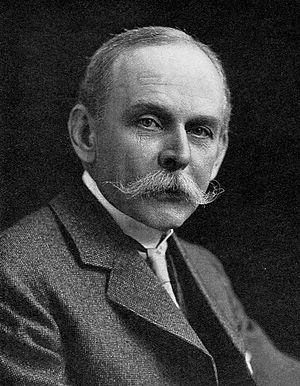Alfred William Alcock facts for kids
Quick facts for kids
Alfred William Alcock
|
|
|---|---|
 |
|
| Born | 23 June 1859 |
| Died | 24 March 1933 (aged 73) Belvedere, Kent (now London)
|
| Citizenship | British |
| Education | Blackheath Proprietary School, Westminster School, Aberdeen University |
| Known for | Describing a wide range of species |
| Spouse(s) | Margaret Forbes Cornwall |
| Parent(s) |
|
| Awards | Fellow of the Royal Society, Order of the Indian Empire, Barclay Medal of the Asiatic Society of Bengal |
| Scientific career | |
| Fields | Medical entomology, herpetology |
| Institutions | Calcutta, Darjeeling, London School of Hygiene & Tropical Medicine |
Alfred William Alcock (born June 23, 1859, in Bombay, India – died March 24, 1933, in Belvedere, England) was a British physician and naturalist. He was especially known for studying crabs and other sea creatures. He also explored many different kinds of animals.
Contents
Early Life and Learning
Alfred Alcock was the son of a sea captain, John Alcock. His family lived in Bombay, India, before moving to Blackheath in England.
Alfred went to schools like Mill Hill School and Westminster School. When he was 17, his family faced money problems. He had to leave school and go back to India. There, he lived with relatives who grew coffee in the Wynaad district. He spent time exploring the jungles of Malabar.
His Career and Discoveries
After coffee farming declined, Alcock worked in an office in Calcutta. This job didn't last long. From 1878 to 1880, he helped find workers for tea gardens in Assam. During this time, a friend gave him a book about how the body works. This book sparked his deep interest in natural science.
He later studied bones and animals on his own. He decided he wanted to become a doctor. In 1880, he became a teacher in Darjeeling. Soon after, his sister moved to India, which allowed him to return to England. He began studying medicine at Aberdeen University in 1881. He did very well and became a doctor in 1885.
Working in India
In 1886, Alcock went back to India. He worked as a doctor with the army in the north-west frontier. He even treated a dangerous snake bite.
In 1888, he joined the Indian Marine Survey ship Investigator. On this ship, he studied animals living in the ocean. He wrote many important papers about his findings. His book, A Naturalist in Indian Seas (1902), is still famous today.
Leading the Indian Museum
Alcock became the superintendent of the Indian Museum in 1893. He worked hard to make the public animal exhibits better. He especially improved the displays of reptiles, fish, and creatures without backbones.
He believed that studying animals was very important for people's health and education. He suggested creating an "Indian Zoological Survey" to study animals in India. This idea was later put into action.
Alcock left the museum in 1906. He felt that the museum needed more support for science. He wanted to make sure future scientists had better conditions.
Later Work in London
Back in London, Alcock started working on tropical medicine. He joined the School of Tropical Medicine. This school focused on diseases common in hot climates.
Alcock received many honors for his work. He became a member of the Royal Society in 1901. This is a very high honor for scientists. He also received the Order of the Indian Empire in 1903.
In 1897, he married Margaret Forbes Cornwall.
What He Achieved
Alfred Alcock was great at identifying and describing new species of animals. He studied many different kinds of fish, crabs, and corals. He also looked at how they lived, where they were found, and how they changed over time.
His books, like "Illustrations of the Zoology of the R.I.M.S. ' Investigator,'", had beautiful and accurate drawings by Indian artists. He also wrote a textbook called "Entomology for Medical Officers." This book was about insects that cause diseases.
Alcock also described five new types of reptiles. He sometimes worked with another English naturalist, Frank Finn.
Animals Named After Him
Many animals have been named after Alfred Alcock to honor his work. Here are a few examples:
- Acromycter alcocki – a type of fish
- Bathynemertes alcocki – a kind of worm
- Sabellaria alcocki – a marine worm
- Pourtalesia alcocki – a sea urchin
- Aristeus alcocki – a shrimp
- Pasiphaea alcocki – another type of shrimp
- The Alcock’s deep-reef basslet (Plectranthias alcocki) – a fish found in the Indian Ocean.
See Also
- List of carcinologists
- Category:Taxa named by Alfred William Alcock
 | Dorothy Vaughan |
 | Charles Henry Turner |
 | Hildrus Poindexter |
 | Henry Cecil McBay |

